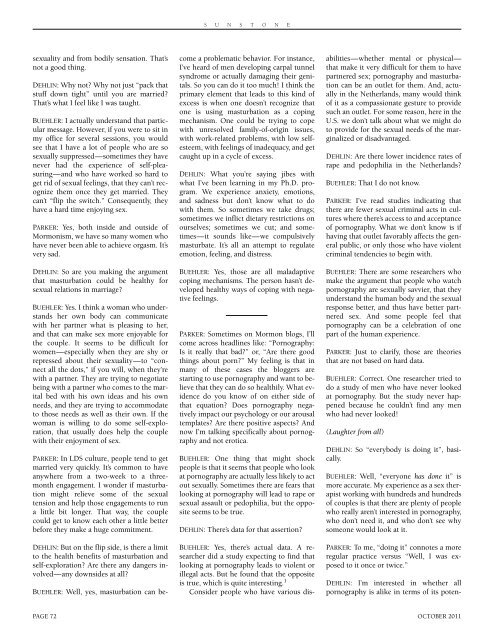Download Entire Issue PDF - Sunstone Magazine
Download Entire Issue PDF - Sunstone Magazine
Download Entire Issue PDF - Sunstone Magazine
Create successful ePaper yourself
Turn your PDF publications into a flip-book with our unique Google optimized e-Paper software.
S U N S T O N E<br />
sexuality and from bodily sensation. That’s<br />
not a good thing.<br />
DEHLIN: Why not? Why not just “pack that<br />
stuff down tight” until you are married?<br />
That’s what I feel like I was taught.<br />
BUEHLER: I actually understand that particular<br />
message. However, if you were to sit in<br />
my office for several sessions, you would<br />
see that I have a lot of people who are so<br />
sexually suppressed—sometimes they have<br />
never had the experience of self-pleasuring—and<br />
who have worked so hard to<br />
get rid of sexual feelings, that they can’t recognize<br />
them once they get married. They<br />
can’t “flip the switch.” Consequently, they<br />
have a hard time enjoying sex.<br />
PARKER: Yes, both inside and outside of<br />
Mormonism, we have so many women who<br />
have never been able to achieve orgasm. It’s<br />
very sad.<br />
DEHLIN: So are you making the argument<br />
that masturbation could be healthy for<br />
sexual relations in marriage?<br />
BUEHLER: Yes. I think a woman who understands<br />
her own body can communicate<br />
with her partner what is pleasing to her,<br />
and that can make sex more enjoyable for<br />
the couple. It seems to be difficult for<br />
women—especially when they are shy or<br />
repressed about their sexuality—to “connect<br />
all the dots,” if you will, when they’re<br />
with a partner. They are trying to negotiate<br />
being with a partner who comes to the marital<br />
bed with his own ideas and his own<br />
needs, and they are trying to accommodate<br />
to those needs as well as their own. If the<br />
woman is willing to do some self-exploration,<br />
that usually does help the couple<br />
with their enjoyment of sex.<br />
PARKER: In LDS culture, people tend to get<br />
married very quickly. It’s common to have<br />
anywhere from a two-week to a threemonth<br />
engagement. I wonder if masturbation<br />
might relieve some of the sexual<br />
tension and help those engagements to run<br />
a little bit longer. That way, the couple<br />
could get to know each other a little better<br />
before they make a huge commitment.<br />
DEHLIN: But on the flip side, is there a limit<br />
to the health benefits of masturbation and<br />
self-exploration? Are there any dangers involved—any<br />
downsides at all?<br />
BUEHLER: Well, yes, masturbation can become<br />
a problematic behavior. For instance,<br />
I’ve heard of men developing carpal tunnel<br />
syndrome or actually damaging their genitals.<br />
So you can do it too much! I think the<br />
primary element that leads to this kind of<br />
excess is when one doesn’t recognize that<br />
one is using masturbation as a coping<br />
mechanism. One could be trying to cope<br />
with unresolved family-of-origin issues,<br />
with work-related problems, with low selfesteem,<br />
with feelings of inadequacy, and get<br />
caught up in a cycle of excess.<br />
DEHLIN: What you’re saying jibes with<br />
what I’ve been learning in my Ph.D. program.<br />
We experience anxiety, emotions,<br />
and sadness but don’t know what to do<br />
with them. So sometimes we take drugs;<br />
sometimes we inflict dietary restrictions on<br />
ourselves; sometimes we cut; and sometimes—it<br />
sounds like—we compulsively<br />
masturbate. It’s all an attempt to regulate<br />
emotion, feeling, and distress.<br />
BUEHLER: Yes, those are all maladaptive<br />
coping mechanisms. The person hasn’t developed<br />
healthy ways of coping with negative<br />
feelings.<br />
PARKER: Sometimes on Mormon blogs, I’ll<br />
come across headlines like: “Pornography:<br />
Is it really that bad?” or, “Are there good<br />
things about porn?” My feeling is that in<br />
many of these cases the bloggers are<br />
starting to use pornography and want to believe<br />
that they can do so healthily. What evidence<br />
do you know of on either side of<br />
that equation? Does pornography negatively<br />
impact our psychology or our arousal<br />
templates? Are there positive aspects? And<br />
now I’m talking specifically about pornography<br />
and not erotica.<br />
BUEHLER: One thing that might shock<br />
people is that it seems that people who look<br />
at pornography are actually less likely to act<br />
out sexually. Sometimes there are fears that<br />
looking at pornography will lead to rape or<br />
sexual assault or pedophilia, but the opposite<br />
seems to be true.<br />
DEHLIN: There’s data for that assertion?<br />
BUEHLER: Yes, there’s actual data. A researcher<br />
did a study expecting to find that<br />
looking at pornography leads to violent or<br />
illegal acts. But he found that the opposite<br />
is true, which is quite interesting. 1<br />
Consider people who have various disabilities—whether<br />
mental or physical—<br />
that make it very difficult for them to have<br />
partnered sex; pornography and masturbation<br />
can be an outlet for them. And, actually<br />
in the Netherlands, many would think<br />
of it as a compassionate gesture to provide<br />
such an outlet. For some reason, here in the<br />
U.S. we don’t talk about what we might do<br />
to provide for the sexual needs of the marginalized<br />
or disadvantaged.<br />
DEHLIN: Are there lower incidence rates of<br />
rape and pedophilia in the Netherlands?<br />
BUEHLER: That I do not know.<br />
PARKER: I’ve read studies indicating that<br />
there are fewer sexual criminal acts in cultures<br />
where there’s access to and acceptance<br />
of pornography. What we don’t know is if<br />
having that outlet favorably affects the general<br />
public, or only those who have violent<br />
criminal tendencies to begin with.<br />
BUEHLER: There are some researchers who<br />
make the argument that people who watch<br />
pornography are sexually savvier, that they<br />
understand the human body and the sexual<br />
response better, and thus have better partnered<br />
sex. And some people feel that<br />
pornography can be a celebration of one<br />
part of the human experience.<br />
PARKER: Just to clarify, those are theories<br />
that are not based on hard data.<br />
BUEHLER: Correct. One researcher tried to<br />
do a study of men who have never looked<br />
at pornography. But the study never happened<br />
because he couldn’t find any men<br />
who had never looked!<br />
(Laughter from all)<br />
DEHLIN: So “everybody is doing it”, basically.<br />
BUEHLER: Well, “everyone has done it” is<br />
more accurate. My experience as a sex therapist<br />
working with hundreds and hundreds<br />
of couples is that there are plenty of people<br />
who really aren’t interested in pornography,<br />
who don’t need it, and who don’t see why<br />
someone would look at it.<br />
PARKER: To me, “doing it” connotes a more<br />
regular practice versus “Well, I was exposed<br />
to it once or twice.”<br />
DEHLIN: I’m interested in whether all<br />
pornography is alike in terms of its poten-<br />
PAGE 72 OCTOBER 2011

















